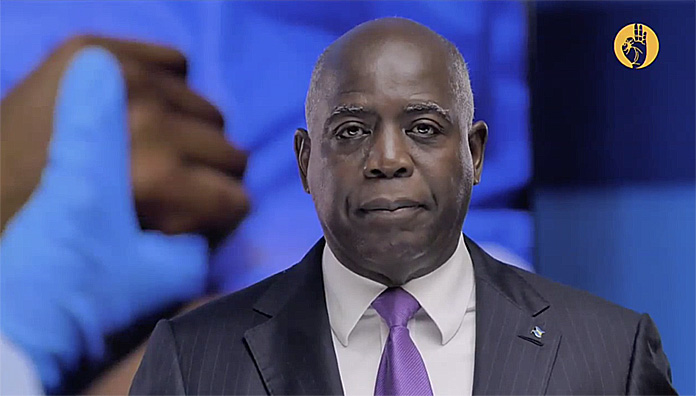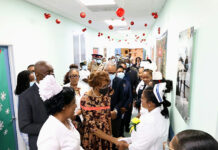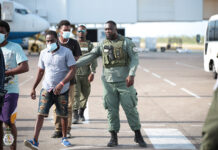
Hon. Philip ‘Brave’ Davis, Q.C.
Prime Minister
M.P., Cat Island, Rum Cay & San Salvador
Good morning, ladies and gentlemen.
As you all know, tomorrow is Christmas Eve, and I extend to all of you my warmest holiday wishes.
I wish I were here today only to wish Bahamians a Merry Christmas and to share our plans for 2022.
Unfortunately, I have a different task this morning, which is to let you know that we are looking at a few extremely difficult weeks ahead because of the Omicron strain of the COVID-19 virus.
I’m going to share with you where we are now, the steps the government is taking, and the steps that you can take yourselves.
For many weeks, we have had a relatively low number of cases.
We have also had an extremely successful two months in our tourism industry – in fact, record-breaking numbers of visitors have brought a much-needed boost to our economy.
In the last few days, however, the number of COVID cases in The Bahamas has increased substantially.
Much of the world is struggling with a new COVID variant, the Omicron strain, which is extremely transmissible – the virus can now jump from person to person very quickly. Although this very contagious new variant was identified just a few weeks ago, it has already become the dominant strain in many countries, and is causing skyrocketing cases, including in our neighbour, the United States.
Let me give you an example of what Omicron can do. Puerto Rico is now recording a daily average of nearly 1100 cases, a 762% increase from two weeks ago. They have recorded more cases in the past seven days than during any other week in the pandemic.
That is what exponential growth looks like – an explosion of cases.
We have sent samples from positive cases here in The Bahamas to a specialized lab to confirm that Omicron is here in The Bahamas, and we will have an answer very soon. But we are assuming that it is already here and acting accordingly.
Let me tell you why we are making that assumption: We recorded 26 positive cases on Monday, 73 on Tuesday, and 140 on Wednesday this week.
As serious as recent developments are, there is some good news – new data shows that Omicron does appear to cause more mild disease than earlier strains of the virus. A smaller percentage of people may become seriously ill. However, because it transmits so easily, we are talking about a smaller percentage of a much larger number of cases. For that reason, Omicron is already overwhelming hospitals across the world, including in many states in America and many countries in Europe. Many places are reporting their highest daily totals of cases since this virus began.
Countries around the world are pursuing new strategies to contain the worst impact of the virus.
We need to do the same here now.
The number of cases here is likely to go up quickly and substantially. I am going to tell it to you straight: because Omicron is so contagious, we could be entering the worst phase of the pandemic.
We must do whatever we can to reduce the total number of infections; we want as few of those infections to cause serious illness as possible; and we want to reduce the impact, which unfortunately will be severe, on our clinics and hospitals.
I have been working with the Minister of Health, Dr. Michael Darville, to consult a variety of experts and professionals, and as a result, we are adopting a number of steps immediately. Please understand that the situation is fluid, and we will continue to adapt and make adjustments to our nation’s strategy as needed.
We have acquired hundreds of thousands of medical-grade masks and intend to distribute those in communities across the country in the coming days. COVID is an airborne disease – infectious particles of the virus can hang in the air for hours in indoor spaces, and therefore the right masks can and do make a big difference.
We are also implementing new rules at the borders. We are changing the requirements for entering the country: Bahamians and visitors must test negative within three days of entering the country, instead of five, and beginning on January 7th, a negative PCR test will be required for all. Rapid antigen testing remains a critical tool, but a PCR test is more sensitive and can pick up an infection earlier in its course than the antigen test.
Effective immediately, we are changing the rules about the size of gatherings that are permitted. Indoor gatherings should not have more than 20 people, outdoor gatherings no more than 30.
We are going to increase outreach so that adults who are vaccinated receive a booster, as the booster appears to offer substantial additional protection from serious illness. (We are also making concerted efforts to reach those who are not yet vaccinated at all – but unfortunately, it will take weeks for those just now receiving first shots to have the protections that the vaccines confer. It is still important – because COVID will still be circulating in several weeks. Our vaccination efforts will include outreach in inner city communities and to undocumented migrants who may have struggled with online registrations, or access to vaccine venues).
We will also be taking new measures to provide technical guidance to businesses, churches, and others so that these places can be made as safe as possible. Because COVID is airborne, ventilating indoor spaces and filtrating the air when possible can make a big difference.
We continue to progress as quickly as we can to make Covid-testing free. Requests For Proposals will be sought imminently, before we swiftly move to confirming a vendor who can meet the standards which are essential for this programme to work well.
We are also taking steps to enhance our ability to respond to infections that require treatment.
We are readying to mobilize multiple field hospitals should the number of hospitalizations grow. In New Providence, we are planning to utilize the Nursing School and the National Stadium, and we are in discussions with an international partner to open a field hospital in Grand Bahama. We are identifying additional options in the Family Islands. Plans include the provision of equipment necessary to support the delivery of care to patients with moderate to severe symptoms.
We are recruiting additional nurses and hospital staff.
We are working to build partnerships with multiple international non-profits.
There is very hopeful news about new treatments for COVID, and we are working to purchase new medications that can be effective at reducing the severity of the disease. Because there is very high global demand, we will be competing with many other countries to obtain them, so we cannot forecast today the precise date we will have access to these treatments.
We also want to reduce the negative impact that a surge in COVID cases has on routine health services. The South Beach Health Centre is being prepared, so that those services can continue, even as we deal with this new wave of COVID.
We will in the coming days also launch a new public education programme, to empower Bahamians to keep themselves and their families safe, and to combat the misinformation that continues to spread on social media.
Minister Darville and the members of the health team, will provide greater detail about our plans in a moment. But I wanted to provide this update myself, because I want to underscore how serious this moment is for our country.
I have just described a multi-faceted plan the implementation of which requires building a coalition of partners: we will be working with health-care professionals, the COVID Enforcement Unit, the Royal Bahamas Defence Force, the private sector, and multiple international partners.
The final and most important member of this coalition is you – the Bahamian people. We are all in this together.
Everyone is ready to put COVID behind them, especially during the holidays. It has been an extremely difficult few years, and we are ready to relax and celebrate. Unfortunately, the virus has changed, and so our behavior must change, too.
I want to emphasize that activities that were relatively safe just last week are no longer safe.
That is how quickly things have changed here.
We all need to adjust our own thinking about what risks are acceptable, and we need to do it quickly.
It’s important to understand that vaccinated people are at much, much lower risk for experiencing severe disease – but vaccinated people can still catch and spread Omicron. Some vaccinated individuals who are infected will have no symptoms, some will have mild symptoms, and some will even have serious cases. And just as vaccination reduces but does not eliminate the chance you will contract the virus, prior infection also does not provide full protection. Omicron has shown that it can infect those who have had COVID in the past.
Unfortunately, I can offer you an example from my own personal experience. Last weekend, we had a family gathering which included several family members who travelled here from abroad. Even though everyone was vaccinated, and everyone tested negative before travel, several of those who were visiting from abroad tested positive on the fifth day after arrival in the country. Since then, my wife and other family members have tested positive. I remain negative.
Because they were vaccinated, they are either asymptomatic or are experiencing only mild symptoms. I am so grateful that that is the case.
But I know that many of our Christmas gatherings will include both vaccinated and unvaccinated family members. Here is what I am asking you to do: please plan those gatherings with your most vulnerable family members in mind. That means the elderly, or those who are diabetic, or those who are immuno-compromised because of cancer treatment or other conditions or treatments. Remember that our children under 12 have not yet been vaccinated. Plan your gatherings with the goal of protecting these family members. Outside is safer than inside, always – the virus particles can hang in the air inside for hours. We are blessed with beautiful warm weather, and the forecast for the week ahead is for sunny skies.
So, here’s the best advice from medical professionals and scientists:
Avoid large gatherings.
Outside is always safer than inside; limit your time indoors to the extent possible.
When you’re inside – open as many windows and doors as you can, to reduce the number of virus particles in the air.
Wear your masks. The government will be distributing medical-grade masks – if you already have one, now is the time to switch to using it all the time. If you don’t have one yet, use two masks instead of one – double-masking can help.
If you are vaccinated, get your booster shot.
If you are unvaccinated, you are at serious risk – please do what billions have done safely worldwide and get vaccinated.
If you have cold or flu symptoms, please get tested, and do not go to work or gather with others.
I wish I did not have to deliver this news before Christmas Eve. I told you earlier that members of my family have tested positive. I have taken multiple tests over the last few days, and all the results have been negative. I still need to do the responsible thing and self-isolate according to the rules. Being apart from your family is not easy – and it is especially difficult during Christmas-time.
But the most important part of being in a family is taking care of each other. Let’s all take care of each other in the coming weeks, as one big Bahamian family.
END







